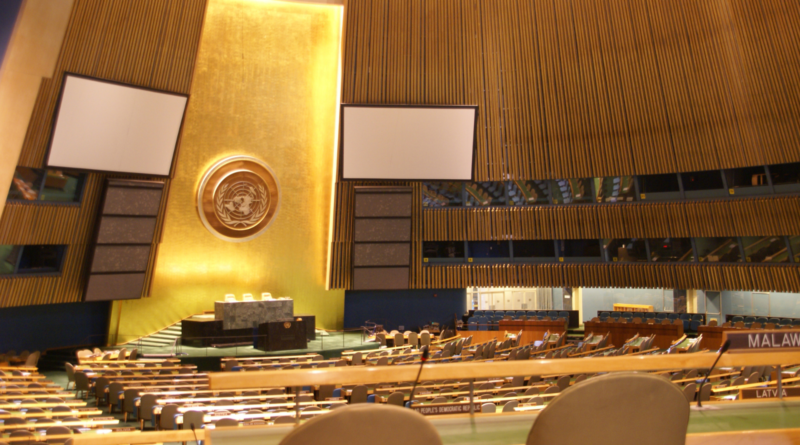CICOPA welcomes the first ever UN resolution on Social and Solidarity Economy
19 April 2023
On April 18, United Nations General Assembly in New York adopted the first ever UN resolution on Promoting the social and solidarity economy for sustainable development. CICOPA welcomes this important achievement of the UN.
On April 18 2023, United Nations General Assembly in New York adopted the first ever UN resolution on Promoting the social and solidarity economy for sustainable development. While the UN has previously recognized the importance of cooperatives, including through its numerous resolutions on Co-operatives in Social Development (the latest of them adopted in 2021), this will be the first time that the wider social economy is recognized by the UN on such a level.
The social and solidarity economy, as defined by the UN, includes cooperatives, associations, mutual societies, foundations, social enterprises, self-help groups and other entities operating in accordance with the values and principles of the social and solidarity economy.
CICOPA welcomes the new resolution, as it helps to further increase the visibility of cooperatives at the UN level and complements the existing resolutions specifically on cooperatives.
CICOPA president Iñigo Albizuri Landazabal says: “CICOPA sees the first ever UN resolution on Promoting the social and solidarity economy for sustainable development as an important achievement. In particular, we hope that the UN Member States will adopt an inclusive approach and will make use of it in order to develop adequate support measures and legal frameworks for all cooperatives, including worker and social cooperatives. It is essential to recognise that cooperatives operate in all sectors of the economy, including industry, and provide a huge contribution to the achievement of multiple Sustainable Development Goals”.
For cooperatives active in industry, the following points in the resolution are particularly important:
- a reiterated commitment to supporting micro-, small and medium-sized enterprises and cooperatives throughout the value chain, in both the formal and informal economies
- acknowledgment of cooperatives’ contribution to social and economic development of Indigenous Peoples, local communities and all people, to social transformation and social and technological innovation
- the contribution of social and solidarity economy (so including cooperatives) to the transition from the informal to the formal economy
- the acknowledgement of the contribution of social and solidarity economy to “the achievement and localization of the Sustainable Development Goals, particularly in terms of employment and decent work, the provision of social services, such as those related to health and care, education and skills training, environmental protection, including through the promotion of sustainable economic practices, the promotion of gender equality and the empowerment of women, access to affordable finance and local economic development, the strengthening of the productive capacities of people in vulnerable situations, the promotion of social dialogue, labor rights and social protection, as well as inclusive and sustainable growth, the forging of partnerships and networks at the local, national, regional and international levels and the promotion of participatory governance and policymaking and all human rights”
- the recognition that the social and solidarity economy encourages a just and sustainable digital transition
Furthermore, the resolution encourages the UN Member States to promote, support and enhance social and solidarity economy by developing and implementing specific legal frameworks, strategies, policies and programs; making social and solidarity economy visible in the national statistics; providing fiscal and public procurement incentives; acknowledging the social and solidarity economy in education curricula and capacity-building and research initiatives; reinforcing entrepreneurship and business support, including by facilitating access to financial services and funding; and engaging social and solidarity economy actors in the policymaking process.
The resolution also encourages financial support from the multilateral, international and regional financial institutions and development banks, and invites relevant entities of the United Nations development system, including United Nations country teams, to give due consideration to the social and solidarity economy as part of their planning and programming instruments.
In doing so, the new UN resolution responds to multiple needs of cooperatives, including the ones previously identified by CICOPA in its position. CICOPA especially calls on the governments to include the “cooperative way of doing business” in the educational curricula in secondary and tertiary education; to provide adequate legal frameworks, which will enable worker and social cooperatives to fully participate in business activities; to offer adequate financial support / access to finance; and to include the cooperative movement, through its representative organizations, in social dialogue processes together with trade unions, governments and mainstream business organizations.
Nevertheless, we regret that the text does not recognise SSE’s (including cooperatives’) contribution to fair and inclusive technological innovation and its contribution to provide innovative solutions to emerging societal needs. Moreover, it fails to recognise the important role that SSE, and in particular cooperatives, play in catalysing challenges caused by the emerging work trends, in providing dignified working conditions, security and protection to non-standard and precarious workers (freelancers, platform workers, self-employed, micro-entrepreneurs etc). We believe that the future work of the UN and the Members States should dedicate greater attention to those issues.
CICOPA hopes that the present resolution will be given appropriate follow-up in the future decisions of the UN system bodies and the Member States.
More information:
CICOPA is the International Organisation of Cooperatives active in the sectors of industry and services. CICOPA gathers 51 members from 35 countries, who affiliate 65,000 enterprises employing 4 million persons across the world. According to our latest global study, CICOPA represents over 270 million industrial and service cooperative workers around the globe.
UN General Assembly is the main policy-making organ of the United Nations, in which all of its 193 Member States are represented. Resolutions are the formal expression of General Assembly will. They are, however, not legally binding on the Member States and have a recommendatory character.
The Resolution Promoting the Social and Solidarity Economy for Sustainable Development (A/77/L.60) is available in Arabic, Chinese, English, French, Russian, and Spanish.

